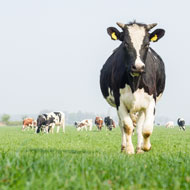
Increased efficiency supports both production and conservation
A new study offers a framework for British farms to produce more food, whilst also supporting wildlife.
Scotland’s Rural College (SRUC) joined forces with Edinburgh Napier University and the Royal Botanic Gardens Kew, to design different feed rations for a model dairy herd.
The team explored how different mixtures of crops affected farmland wildlife, especially spiders and plants.
Using complex statistical models, they discovered it was possible to increase land efficiency by manipulating the crops needed to meet the dietary requirements of the herd. This freed up land which could be used for additional production or promoting biodiversity.
According to findings published in the Journal of Applied Ecology, biodiversity was greatest when the efficiency of the system was increased and spare land devoted to species-rich grassland.
Interestingly, biodiversity gains were also seen when the spare land was used for additional crop production. The largest gains were achieved when these extra crops supported different wildlife species.
Dr Patrick White, lecturer in conservation biology at Edinburgh Napier, said: “Optimum farmland composition typically depends on whether to maximise production or biodiversity. But we have shown this doesn’t have to be the case.
“Greatest ‘win-wins’ can be achieved by making productive land cover more diverse and selecting crops that complement each other in the species they support.”



 The RCVS has announced a new version of its 1CPD mobile app, with enhanced features for veterinary surgeons and veterinary nurses to record their continuing professional development.
The RCVS has announced a new version of its 1CPD mobile app, with enhanced features for veterinary surgeons and veterinary nurses to record their continuing professional development.